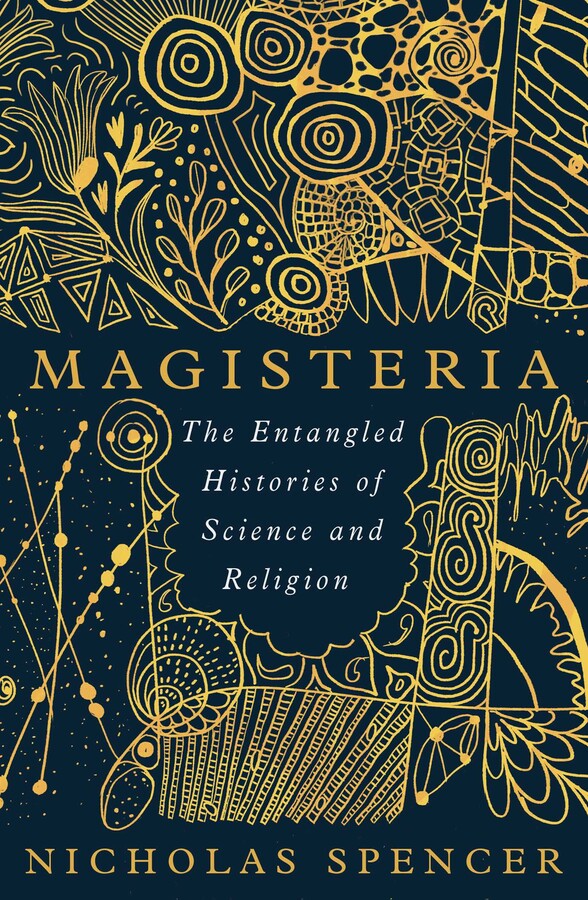This review complements an earlier 2024 CPOSAT review of this book, by D. Gareth Jones, and a review essay by James C. Ungureanu in October 2023 CPOSAT.
Book Reviewed by Ian Harper, July 2024
Magisteria: The Entangled Histories of Science and Religion
by Nicholas Spencer
London: Oneworld Publications, 2023; 467 pages
ISBN 9780861544615, 1st edition, hardcover
AUD$52
Readers of books on science and religion written for a general audience will recognise the name, Nick Spencer, as the author of Darwin and God (SPCK 2009) and The Evolution of the West (SPCK 2016), both written while he was research director at Theos, a Christian think tank in London, UK. Now risen to Senior Fellow at Theos and a Fellow of the International Society for Science and Religion, he has graduated from Nick to Nicholas, and written what the Sunday Times has described as “surely his magnum opus.”
The historical span of Spencer’s latest book is immense, from the ancient world to the present day, rich in detail and written with characteristic verve. Other reviewers comment on the sheer readability of the prose and the author’s capacity to fascinate his readers with illuminating detail and the sweep of his perspective. This reviewer was similarly engaged; for a book of its length (over 400 pages) and subject matter, keeping the argument moving along briskly is quite an achievement.
Spencer’s theme is that the supposed antipathy between science and religion is wildly exaggerated in the popular imagination and largely founded on myths. The reality is both more complex and more convoluted. That said, the myths are not total fabrications but rather distortions or partial renderings of historical encounters that were more subtle and multi-faceted than their re-telling has allowed. When placed in historical context, the famous encounters between Galileo and Pope Urban VIII, Thomas Huxley and Bishop Samuel Wilberforce, and William Jennings Bryan and Clarence Darrow at the Scopes trial reveal a more complex entanglement of faith and reason than a simple clash of religion and science would imply.
The book divides its narrative into four parts. The first examines the pre-history of science as we now know it and traces the emergence of scientia and religio as separate but related aspects of human experience when “everyone worshipped god(s).” The second part, titled “Genesis,” describes the beginnings of modern science and the role of religion as midwife (assisting at the birth of science) and nursemaid (nourishing science’s progress through its infancy). The third part, “Exodus,” describes the coming-of-age of science as a professional and specialised pursuit in its own right, no longer the province of amateurs, and the rise of overt antipathy between those who saw science as a growing threat to faith and those who saw religious objection as grounded in obscurantism and wilful ignorance. The fourth and final part brings the discussion into the twentieth and twenty-first centuries, when the blurring of faith and reason has become, if anything, more marked with the emergence of quantum physics and artificial intelligence.
Towards the end of his life, the American palaeontologist, Stephen Jay Gould, sought to silence protagonists in an increasingly feverish science versus religion debate, waged among others by so-called New Atheists, by declaring that science and religion occupied “non-overlapping magisteria.” The intention was metaphorically to send each of the bickering parties to their own rooms, thereby silencing fruitless arguments over matters that neither had ultimate authority to adjudicate. Spencer acknowledges Gould’s good intentions in trying to defuse antagonism but concludes that history fails to support his characterisation. To the contrary, “the ‘magisteria’ of science and religion are indistinct, sprawling, untidy, and endlessly and fascinatingly entangled” (p. 11).
The entanglement arises, as Spencer explains, because science and religion both seek to understand the nature of the human condition (who, or what, are we?) and each asserts authority in putting forward its perspective. Entanglement is inevitable if naive reductionism (“nothing buttery”) is to be avoided. Scientists are surely right to debunk “young earth” creationists but theologians are equally right to affirm that Genesis was not written, and should not be read, as a scientific account of the beginning of life on Earth. Similarly, religious adherents are surely right to question the idea that morality is just relative, as suggested by sociobiological explanations of the human condition. They are also right to point out the contradictions in attempts to balance the idea that biology determines our behaviour with the belief that we have the freedom to act against our own “selfish” genes.
There is as much to learn from Spencer’s detailed account of the engagement of religion and science as there is about the faith lives of individual scientists and the scientific (or proto-scientific) interests of people of faith. The twin “books” of nature and of Scripture appear to have influenced people on all sides of the various debates, sometimes in ways they themselves have less than fully appreciated. This too is further evidence in support of Spencer’s entanglement thesis.
One final point is that the book deals at some length with the early history of Islam and science, including the debt Western science owes to Islamic scholarship prior to the thirteenth century. Indeed, the words “algebra” and “algorithm” derive from the names of ancient Islamic scholars. There is also a brief discussion of the tension within Islam between the science of evolution and the Quranic explanation of life’s origins. The science–religion debate is not unique to Christianity, although Islam has proven, in Spencer’s telling, ultimately less conducive to the development of modern science than Christianity, a point apparently lost on those determined to demonise the Church as the enemy of scientific progress.
Magisteria is in equal parts enlightening, entertaining, engaging, and informative. It is especially recommended as a gift to non-believing friends who might have imbibed, often without realising, the commonplace view that science long ago displaced religion as the authoritative source of knowledge on the human condition and that no scientist worthy of the name could sensibly think otherwise.

